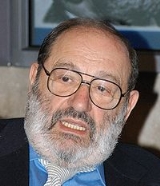
(born 5 January 1932) is an Italian semiotician
, essayist
, philosopher, literary critic, and novelist, best known for his novel The Name of the Rose
(Il nome della rosa, 1980), an intellectual mystery combining semiotics in fiction, biblical analysis, medieval studies and literary theory. He has also written academic texts, children's books and many essays. Eco is the founder of the Dipartimento di Comunicazione at the University of San Marino, President of the Scuola Superiore di Studi Umanistici, University of Bologna
, member of the Accademia dei Lincei
(since November 2010) and an Honorary Fellow of Kellogg College, University of Oxford
.
The day after the fall of Nikita Khrushchev|Khrushchev, the editors of Pravda, Izvestiia, the heads of the radio and television were replaced; the army wasn't called out. Today a country belongs to the person who controls communications.![]()
In the United States, politics is a profession, whereas in Europe it is a right and a duty.![]()
To read fiction means to play a game by which we give sense to the immensity of things that happened, are happening, or will happen in the actual world. By reading narrative, we escape the anxiety that attacks us when we try to say something true about the world. This is the consoling function of narrative — the reason people tell stories, and have told stories from the beginning of time.![]()
Reflecting on these complex relationships between reader and story, fiction and life, can constitute a form of therapy against the sleep of reason, which generates monsters.![]()
After all, the cultivated person's first duty is to be always prepared to rewrite the encyclopaedia.![]()
I don't miss my youth. I'm glad I had one, but I wouldn't like to start over.![]()
There are magic moments, involving great physical fatigue and intense motor excitement, that produce visions of people known in the past. As I learned later from the delightful little book of the Abbé de Bucquoy, there are also visions of books as yet unwritten.
![]()
A monk should surely love his books with humility, wishing their good and not the glory of his own curiosity; but what the temptation of adultery is for laymen and the yearning for riches is for secular ecclesiastics, the seduction of knowledge is for monks.
![]()

